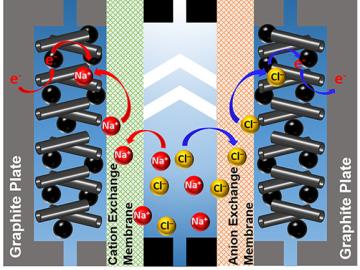
Filter News
Area of Research
- Advanced Manufacturing (3)
- Biological Systems (1)
- Biology and Environment (33)
- Computational Biology (1)
- Computational Engineering (3)
- Computer Science (5)
- Energy Science (36)
- Fusion and Fission (1)
- Fusion Energy (1)
- Isotope Development and Production (1)
- Isotopes (10)
- Materials (39)
- Materials for Computing (5)
- Mathematics (1)
- National Security (10)
- Neutron Science (24)
- Nuclear Science and Technology (8)
- Quantum information Science (1)
- Supercomputing (40)
News Type
News Topics
- (-) Artificial Intelligence (51)
- (-) Bioenergy (42)
- (-) Biomedical (28)
- (-) Clean Water (16)
- (-) Isotopes (25)
- (-) Machine Learning (27)
- (-) Physics (30)
- (-) Space Exploration (13)
- (-) Summit (30)
- 3-D Printing/Advanced Manufacturing (82)
- Advanced Reactors (25)
- Big Data (25)
- Biology (47)
- Biotechnology (14)
- Buildings (36)
- Chemical Sciences (48)
- Composites (23)
- Computer Science (105)
- Coronavirus (28)
- Critical Materials (23)
- Cybersecurity (20)
- Education (3)
- Element Discovery (1)
- Emergency (1)
- Energy Storage (75)
- Environment (86)
- Exascale Computing (14)
- Fossil Energy (2)
- Frontier (17)
- Fusion (26)
- Grid (38)
- High-Performance Computing (44)
- Hydropower (6)
- Irradiation (2)
- ITER (5)
- Materials (96)
- Materials Science (90)
- Mathematics (3)
- Mercury (5)
- Microelectronics (1)
- Microscopy (28)
- Molten Salt (8)
- Nanotechnology (41)
- National Security (21)
- Neutron Science (81)
- Nuclear Energy (47)
- Partnerships (33)
- Polymers (23)
- Quantum Computing (18)
- Quantum Science (42)
- Security (13)
- Simulation (19)
- Statistics (2)
- Transportation (62)
Media Contacts

An ORNL-led team's observation of certain crystalline ice phases challenges accepted theories about super-cooled water and non-crystalline ice. Their findings, reported in the journal Nature, will also lead to better understanding of ice and its various phases found on other planets, moons and elsewhere in space.

Using Summit, the world’s most powerful supercomputer housed at Oak Ridge National Laboratory, a team led by Argonne National Laboratory ran three of the largest cosmological simulations known to date.

In a step toward advancing small modular nuclear reactor designs, scientists at Oak Ridge National Laboratory have run reactor simulations on ORNL supercomputer Summit with greater-than-expected computational efficiency.

Oak Ridge National Laboratory is using artificial intelligence to analyze data from published medical studies associated with bullying to reveal the potential of broader impacts, such as mental illness or disease.

A team of scientists led by Oak Ridge National Laboratory used carbon nanotubes to improve a desalination process that attracts and removes ionic compounds such as salt from water using charged electrodes.

OAK RIDGE, Tenn., March 20, 2019—Direct observations of the structure and catalytic mechanism of a prototypical kinase enzyme—protein kinase A or PKA—will provide researchers and drug developers with significantly enhanced abilities to understand and treat fatal diseases and neurological disorders such as cancer, diabetes, and cystic fibrosis.

OAK RIDGE, Tenn., March 11, 2019—An international collaboration including scientists at the Department of Energy’s Oak Ridge National Laboratory solved a 50-year-old puzzle that explains why beta decays of atomic nuclei


OAK RIDGE, Tenn., March 4, 2019—A team of researchers from the Department of Energy’s Oak Ridge National Laboratory Health Data Sciences Institute have harnessed the power of artificial intelligence to better match cancer patients with clinical trials.

OAK RIDGE, Tenn., March 1, 2019—ReactWell, LLC, has licensed a novel waste-to-fuel technology from the Department of Energy’s Oak Ridge National Laboratory to improve energy conversion methods for cleaner, more efficient oil and gas, chemical and


